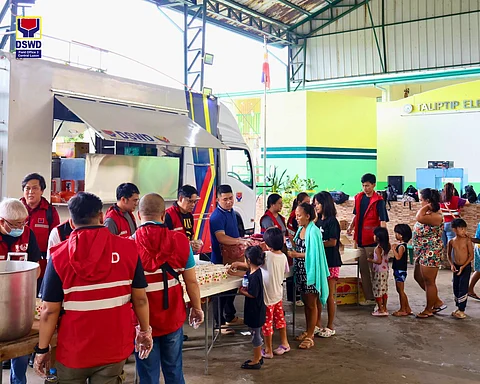
- NEWS
- the EDIT
- COMMENTARY
- BUSINESS
- LIFE
- SHOW
- ACTION
- GLOBAL GOALS
- SNAPS
- DYARYO TIRADA
- MORE

Social Welfare Secretary Rex Gatchalian on Monday said the government’s flagship anti-hunger initiative, the Walang Gutom Program (WGP), is showing signs of progress more than a year since it was rolled out nationwide.
“We’re trying to end hunger and we’ve already made strides in it,” Gatchalian told reporters on 28 July, as he pointed to survey data showing a reduction in self-reported hunger among participating households.
A Social Weather Stations (SWS) survey commissioned by Globe Telecom found that among WGP beneficiaries, the percentage of families experiencing moderate hunger declined by 4.1 points —from 48.7 percent in October 2024 to 44.6 percent in December.
“We already have 300,000 Walang Gutom beneficiaries in the program as we speak. This was scaled up last year after the pilot,” Gatchalian said. “Of the 300,000, they saw a 4-percentage point — or significant — number of families saying that we are not hungry anymore, that we are food secure.”
“So, meaning, in the first 300,000 drawn, it was said that a 4-percent reduction in those experiencing hunger was noted,” he added.
The WGP, previously called the Food Stamp Program, was launched in 2023 and institutionalized a year later through Executive Order 44.
It is one of the Marcos administration’s key initiatives aimed at addressing food insecurity and undernutrition, with a target to eliminate hunger before the end of President Ferdinand Marcos Jr.’s term in 2028.
The program provides qualified low-income families with electronic benefit transfer (EBT) cards loaded with P3,000 in monthly food credits. The credits can be used at accredited retailers to purchase nutritious food items.
Aside from food subsidies, the program also includes a livelihood component meant to transition beneficiaries toward self-sufficiency. According to Gatchalian, the work requirement is built into the program design.
“There’s a work component to it. Meaning, the one able-bodied family member has to go to DoLE-sponsored job fairs for them, apply for a job. TESDA is doing job training for them. So, it’s a one-two punch approach,” he said.
Gatchalian said the WGP also seeks to address long-term issues like malnutrition, child stunting, and barriers to education.
“We cannot unlock their value if we’re not investing in them — if they’re hungry, if they are unable to study, if their growth is stunted,” he explained.
The program’s implementation is being closely monitored by the Department of Social Welfare and Development, which has partnered with other government agencies.
“No administration except the Marcos Jr. administration has a concrete anti-hunger program,” Gatchalian said.
